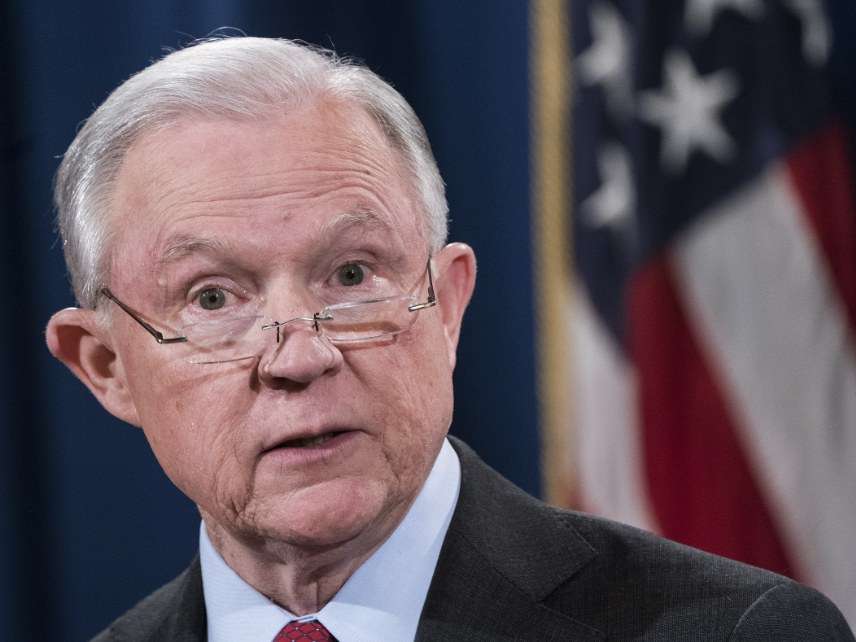Jeff Sessions Is Set to Give Prosecutors Free Rein to Enforce Federal Marijuana Ban
Sources say he's rescinding a memo that restricted Justice Department's role under Obama administration.

Attorney General Jeff Sessions is planning to free federal prosecutors to decide for themselves how and whether to go after marijuana providers and users in states where consumption is legal.
The Associated Press is reporting this change in advance a formal announcement that's supposed to come later today. Sessions' decision would rescind guidance under the previous administration to limit enforcement of federal marijuana laws in states where consumption is legal to certain situations to keep it from being trafficked to other states and out of the hands of children and keeping the proceeds out of the hands of gangs.
This guidance, known as the Cole memo (after former Deputy Attorney General James Cole), is being rescinded by Sessions, the Associated Press reports. It's not entirely clear what will happen when the memo from 2013 is rescinded, but it's possibly a great big shot across the bow of a growing industry. California just legalized recreational marijuana sales and consumption at the start of the new year. New Hampshire is considering a bill right now. Despite popular opinion in favor of legalization, Sessions subscribes to the old school "gateway drug" nonsense. From the A.P.'s report this morning:
Sessions and some law enforcement officials in states such as Colorado blame legalization for a number of problems, including drug traffickers that have taken advantage of lax marijuana laws to hide in plain sight, illegally growing and shipping the drug across state lines, where it can sell for much more. The decision was a win for pot opponents who had been urging Sessions to take action.
"There is no more safe haven with regard to the federal government and marijuana, but it's also the beginning of the story and not the end," said Kevin Sabet, president and CEO of Smart Approaches to Marijuana, who was among several anti-marijuana advocates who met with Sessions last month. "This is a victory. It's going to dry up a lot of the institutional investment that has gone toward marijuana in the last five years."
Threats of a federal crackdown have united liberals who object to the human costs of a war on pot with conservatives who see it as a states' rights issue. Some in law enforcement support a tougher approach, but a bipartisan group of senators in March urged Sessions to uphold existing marijuana policy. Others in Congress have been seeking ways to protect and promote legal pot businesses.
What about the law by Congress preventing the Justice Department from spending money to try to fight marijuana use in states that had legalized it? The good news is that the Rohrbacher-Farr amendment is still intact. The bad news is that it expires on Jan. 19 if it's not renewed. It was extended briefly as part of the year-end spending bill to keep the government going.
The worse news is that the amendment only forbids the Justice Department from meddling in legalized medical marijuana use. It doesn't stop the Justice Department from going into states that have legalized recreational use. The Cole memo didn't focus on recreational vs. medical use but was about prioritizing certain enforcement goals to protect public safety in a world where marijuana use was becoming accepted and permitted.
As it stood, even with the Cole memo, we saw federal prosecutors in the Obama administration target medical marijuana producers who were operating legally under state laws. Nobody can actually say for sure what will happen if the Cole amendment is rescinded, itself a serious problem. Whether or not a marijuana grower ends up in the crosshairs of a prosecutor depends on that prosecutor's own goals and discretion, not a consistent, predictable application of law.
Reason's Jacob Sullum has previously predicted that Sessions would not start an organized crackdown on state-level legalized medical marijuana use. It would be extremely unpopular and would create massive political headaches. But tossing that memo could result in an unpredictable, disorganized, and confusing crackdown that scares away legal growers, fostering cartels in a dangerous black market.
There will be a lot more news and analysis coming out of Sessions' decision to give prosecutors free rein to ramp the drug war right back up. The Daily Beast just reported yesterday about how one of Sessions' marijuana advisers is a great big drug warrior who wants to mandate (and potentially profit from) drug-testing.
UPDATE: Here's the formal Sessions memo rescinding the Cole memo.


Show Comments (91)